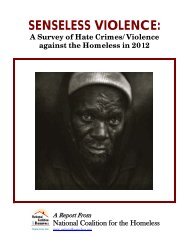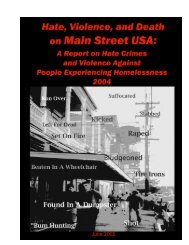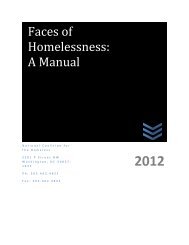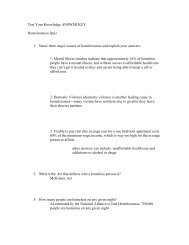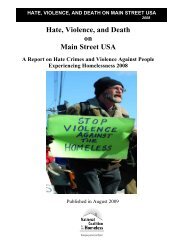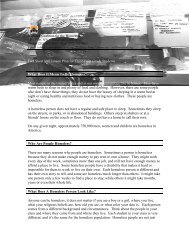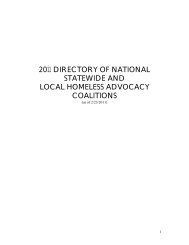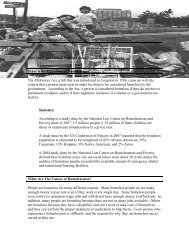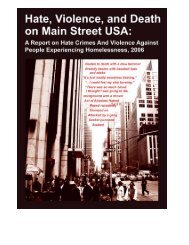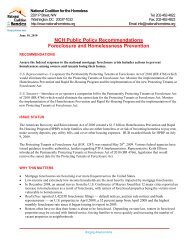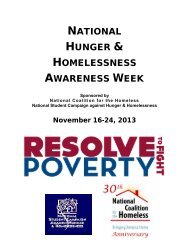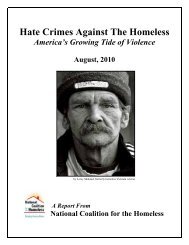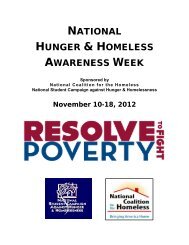The Strength to End Homelessness Lies In The Power of YOUR Vote!
The Strength to End Homelessness Lies In The Power of YOUR Vote!
The Strength to End Homelessness Lies In The Power of YOUR Vote!
You also want an ePaper? Increase the reach of your titles
YUMPU automatically turns print PDFs into web optimized ePapers that Google loves.
Ruling on a challenge <strong>to</strong> Philadelphia’s residency requirements, the District Court for the Eastern District<br />
<strong>of</strong> Pennsylvania held that a homeless voter may satisfy the residency requirements set forth in the<br />
Pennsylvania Election Code by “declaring on the <strong>Vote</strong>r Registration Application the address <strong>of</strong> a shelter<br />
with which the applicant has an established relationship, and which will accept first-class non-forwardable<br />
mail for the applicant.” <strong>The</strong> person must then vote in the district where the shelter is located, even if the<br />
person resides in a different precinct. This ruling provided the basis for Philadelphia’s current policy<br />
regarding registration and voting by homeless peoples.<br />
Collier v. Menzel, 221 CalRptr. 110 (Ct. App. 1985).<br />
Three plaintiffs experiencing homelessness challenged the Santa Barbara county clerk’s rejection <strong>of</strong> their<br />
registration applications, in which they had listed a public park as their residence. <strong>The</strong> court found that the<br />
residence was sufficient for registration purposes because the applicants had a fixed habitation in the park<br />
and intended <strong>to</strong> remain there. <strong>The</strong> court held that denying voter registration because applicants listed a<br />
city park as their residence violated the Equal Protection Clause <strong>of</strong> the Fourteenth Amendment. <strong>The</strong><br />
opinion further stated that people who were experiencing homelessness should be encouraged <strong>to</strong> register<br />
and vote in order <strong>to</strong> provide them with some greatly needed political influence and elec<strong>to</strong>ral power.<br />
Election <strong>of</strong>ficials must now use the specific spot within the park where the persons regularly sleep in<br />
order <strong>to</strong> determine their election district.<br />
Bd. <strong>of</strong> Election Comm’rs v. Chicago/Gray Area Union <strong>of</strong> the Homeless, Circ. Ct. <strong>of</strong> Cook County,<br />
Illinois, County Dept., County Div., Miscl. No. 86-24 (1986).<br />
Addressing a challenge <strong>to</strong> Chicago’s residency requirements for voter registration, the Circuit Court <strong>of</strong><br />
Cook County held that a person lacking a permanent abode may register by stating under oath that she<br />
lacks a permanent abode and by presenting two pieces <strong>of</strong> identification. <strong>The</strong> person who is experiencing<br />
homelessness must also provide a description <strong>of</strong> the location where he or she resides that is specific<br />
enough that election <strong>of</strong>ficials can assign him or her <strong>to</strong> a voter precinct. Prior <strong>to</strong> an election, mail will be<br />
sent <strong>to</strong> the mailing address listed on the registration card and will include a postage prepaid return<br />
postcard which must be mailed back <strong>to</strong> the Board <strong>of</strong> Elections.<br />
Fischer v. S<strong>to</strong>ut, 741 P.2d 217 (Alaska 1987).<br />
A candidate who lost an election appealed for a recount, alleging that election <strong>of</strong>ficials had illegally<br />
rejected ballots <strong>of</strong> voters who claimed <strong>to</strong> reside at a military base. <strong>The</strong> Supreme Court <strong>of</strong> Alaska held that<br />
persons could list a military base generally as their residence, stating that a residence is a fixed place <strong>of</strong><br />
habitation <strong>to</strong> which the individual intends <strong>to</strong> return, and it need not be a house or an apartment, or have<br />
mail service. It need only be a specific locale within the district. <strong>The</strong> court acknowledged that a<br />
homeless shelter or even a park bench would be sufficient.<br />
Walters v. Weed, 752 P.2d 443 (Cal. 1988).<br />
<strong>In</strong>dividuals whose votes were uncounted in a city council election challenged the rejection <strong>of</strong> their ballots.<br />
<strong>The</strong>se individuals had abandoned their domiciles within the precinct and were thus not considered<br />
residents <strong>of</strong> the precinct, rendering their votes invalid. However, many <strong>of</strong> the plaintiffs had not yet met<br />
the requirements <strong>to</strong> establish new domiciles, as they did not live at new locations where they intended <strong>to</strong><br />
stay. <strong>The</strong> California Supreme Court ruled in favor <strong>of</strong> those voters who had not yet established new<br />
domiciles, holding that when a person leaves his or her domicile with no intention <strong>of</strong> returning <strong>to</strong> live<br />
there, and when that person currently resides in a place in which he or she does not intend <strong>to</strong> remain, that<br />
person may vote in the precinct <strong>of</strong> his or her former domicile until a new domicile has been acquired.<br />
65



